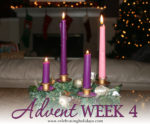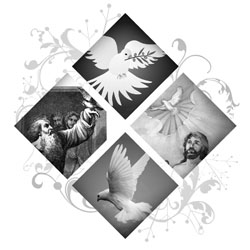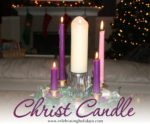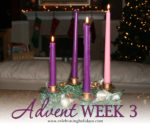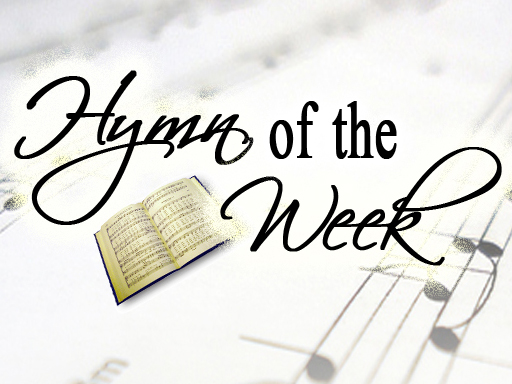Light
The following text is drawn from our featured Christmas book and is also available for free as audio.
 The Bible records that God is “resplendent with light” and “wraps himself in light as with a garment.” Sadly, as a consequence of sin, Adam and Eve, and all their descendants after them, were banished from the presence of God in the Garden of Eden. They were cast into a world of spiritual darkness. Ultimately, only God could deal with the problem of sin; only God could reconcile mankind back to himself; only God could bring humanity back “out of darkness into his wonderful light.” This he accomplished by entering the world as a man.
The Bible records that God is “resplendent with light” and “wraps himself in light as with a garment.” Sadly, as a consequence of sin, Adam and Eve, and all their descendants after them, were banished from the presence of God in the Garden of Eden. They were cast into a world of spiritual darkness. Ultimately, only God could deal with the problem of sin; only God could reconcile mankind back to himself; only God could bring humanity back “out of darkness into his wonderful light.” This he accomplished by entering the world as a man.
Regarding the birth of Jesus, the Gospel of John records, “Light has come into the world.” Jesus himself said, “I have come into the world as a light, so that no one who believes in me should stay in darkness.” Surely, it is appropriate that our Christmas celebration be filled with light as we celebrate Jesus, the “light of the world.”
Interestingly, during the Christmas season, the Jewish people celebrate Hanukkah, also called the “Festival of Lights.” Since the origin of Hanukkah is very relevant to the topic of light, since it is a story of godly people who sought to prepare the way for Messiah, and since it may well have influenced some of the customs of Christmas, it is worth exploring.
Recall that during the Exodus, God commanded his people to make their first menorah, and the burning of its candles was “to be a lasting ordinance among the Israelites for the generations to come.”
With various exceptions, the candles did in fact burn throughout the course of many generations. In the second century BC, the candles were still burning until an evil Seleucid ruler, King Antiochus Epiphanes, forcibly stole them from the temple.
King Antiochus sought to strengthen control over his kingdom by Hellenizing (making Greek in customs, laws and religion) the people. He was ruthless in his dealings with Israel. He arrogantly entered the temple with a strong force and seized all the holy things, including the menorah.
Thus, the candles could no longer burn in the temple of God, and this caused great mourning in Israel. And things would only get worse. Next Antiochus issued a decree demanding that all the people of his kingdom worship his gods.
When a righteous priest named Mattathias saw that many innocent Israelites were losing their lives, he determined to organize an army to defend the people. As the work of this army prospered, and their numbers increased, the aging Mattathias appointed his son Judas Maccabeus as the commander. Soon thereafter, the band of soldiers would come to be known as the Maccabees.
After three years of fighting and a series of victories by Judas’ army, the temple was reclaimed and dedicated to God (“Hanukkah” by the way is the Hebrew word for “dedication”). The menorah burned once again in the temple, and it was a time of great celebration for the Jewish people.
This first Hanukkah ensured that the temple was prepared to receive the Messiah less than two hundred years later. The faith of the Maccabees made certain that the temple was prepared for Messiah to fulfill the prophecy of Malachi (recorded over 400 years before the birth of Christ): “’The Lord you are seeking will come to his temple; the messenger of the covenant, whom you desire, will come,’ says the LORD Almighty.”
The Gospel of Luke records how Mary and Joseph brought the infant Jesus to the temple in Jerusalem to dedicate him to the Lord. Surely, a light much greater than the light of the menorah entered the temple that day, and Simeon, a righteous man, recognized it. He said, “For my eyes have seen your salvation which you have prepared in the sight of all people, a light for revelation to the Gentiles and for glory to your people Israel.”
As we are surrounded by light this Christmas season, let us consider the one who is the true light of the world, Jesus Christ. And though man did not have eyes to see the full splendor of Jesus’ light when he walked on earth, one day (when Jesus makes all things new) we will gaze upon his true glory. In the book of Revelation, the Apostle John records his vision of the new city of Jerusalem: “The city does not need the sun or the moon to shine on it, for the glory of God gives it light, and the Lamb [Jesus] is its lamp.” How amazing that in our eternal home we will live by the light of God’s glory!
Back to Main Christmas Symbols Page.
We welcome your questions and feedback. If you are seeking information on light that is not found on our website, please contact us.
This content has a copyright © 2008 by Angie Mosteller. Please cite the source if you use this material: http://www.celebratingholidays.com/?page_id=1566.
